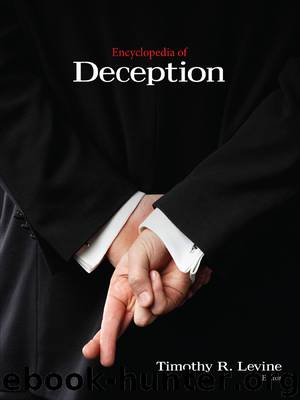Encyclopedia of Deception by Levine Timothy R

Author:Levine, Timothy R.
Language: eng
Format: epub, pdf
ISBN: 9781483388984
Publisher: SAGE
Published: 2014-03-18T16:00:00+00:00
Mass Deception: Ideology as Construction in the Service of Power
Mass deception based on a society’s need to maintain the pre-existing order goes back to Greek mythology. Myths provide answers and explanations for everyday questions. However, myths are not necessarily true but actually are more often fictional stories created in order to maintain order in society. Among Joseph Campbell’s four functions of myth—the mystical (awe-inspiring), cosmological (describing the nature of the universe), sociological (supporting or validating certain social orders), and pedagogical (providing models for living) functions—the relevance of myth here pertains to the latter two, not the former two.
In the modern era myth gives way to ideology. Karl Marx and Friedrich Engels employ the generic term ideology in order to explain how cultures are structured in ways that enable a group in a society to maintain control. Ideology does not necessarily refer only to a process in which groups deliberately plan to oppress people or alter their understanding about how their interpretations of the social world should be. Ideology can be more broadly defined as any attempt to naturalize social practices that have a deep historical origin.
Dominant social classes or institutions in society use symbol systems and social entities such as values and attitudes in such a way as to legitimize the current state, order, or power structures and make them seem “natural.” For example, an argument like “men are better at math and science, whereas women are better at languages” can be a strategic effort to naturalize alleged differences between women and men, naturalizing the superiority of one gender. The historical roots of social expectations about men and women are deleted here, and what is left is an historical stereotype of gender roles. This is also the case for racism. It endorses social practices reflecting the belief that human beings can be categorized into distinct biological groups called race, which assign a certain group of people with specific “natural” attributes.
In contemporary society, ideology permeates the general public as mass deception through various channels. One of those outlets in which individuals can easily find ideology is popular culture, such as soap operas, movies, and popular music. For example, the movie Independence Day, which had a huge box-office success, depicts a war against the aliens from outer space with naturalizing racial differences through action-packed spectacle and computer graphics. In the movie, the three main characters—the president of United States, a scientist, and a soldier—struggle against the attacking aliens. Here, the president who takes charge in the war against the aliens is played by a white Caucasian actor; the scientist who uses his brain to attack the aliens is depicted as Jewish; and the soldier who is shown in most of the physical engagements (hand-to-hand fighting) against the aliens is played by an African American actor. The roles played by these three characters/actors reiterate cultural stereotypes about race and ethnicity, strengthening this ideology to its audience members.
In addition to media content, various social institutions play a significant role in molding cognitive and affective interpretations of the social world consistent with ideologies.
Download
Encyclopedia of Deception by Levine Timothy R.pdf
This site does not store any files on its server. We only index and link to content provided by other sites. Please contact the content providers to delete copyright contents if any and email us, we'll remove relevant links or contents immediately.
| Dictionaries | English |
| Foreign Language Dictionaries & Thesauruses | Lexicography |
| Slang & Idioms | Synonyms & Antonyms |
| Thesauruses |
A Dictionary of Sociology by Unknown(3084)
The Art of Dramatic Writing: Its Basis in the Creative Interpretation of Human Motives by Egri Lajos(3067)
The Dictionary of Body Language by Joe Navarro(2996)
0041152001443424520 .pdf by Unknown(2845)
How The Mind Works by Steven Pinker(2816)
Day by Elie Wiesel(2782)
Merriam-Webster's Collegiate Thesaurus, Second Edition by Merriam-Webster Inc(2758)
The Meaning of the Library by unknow(2571)
The Official Guide to the TOEFL Test by ETS(2330)
A History of Warfare by John Keegan(2243)
The Emotion Thesaurus: A Writer's Guide to Character Expression by Puglisi Becca & Ackerman Angela(2144)
Emotion Amplifiers by Angela Ackerman & Becca Puglisi(2035)
MASTER LISTS FOR WRITERS: Thesauruses, Plots, Character Traits, Names, and More by Bryn Donovan(1943)
Merriam-Webster's Pocket Dictionary by Merriam-Webster(1934)
The Cambridge Guide to English Usage by PAM PETERS(1913)
Star Wars The Rise of Skywalker The Visual Dictionary by Pablo Hidalgo(1899)
More Than Words (Sweet Lady Kisses) by Helen West(1867)
Lucky Jim by Kingsley Amis(1750)
American Accent Training by Ann Cook(1659)
